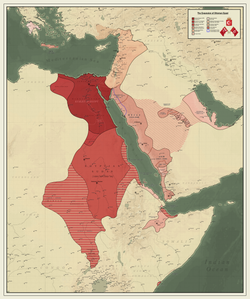Khedivate of Egypt
1867-1914 monarchy in Northeastern Africa
The Khedivate of Egypt (Arabic: الْخُدَيْوِيَّةُ الْمِصْرِيَّةُ, Ottoman Turkish: خدیویت مصر) was an tributary state of the Ottoman Empire, created and ruled by the Muhammad Ali family.
Khedivate of Egypt الْخُدَيْوِيَّةُ الْمِصْرِيَّةُ (Arabic) Khidywyt-al Misr خدیویت مصر (Ottoman Turkish) Hıdiviyet-i Mısır | |||||||||||||||
|---|---|---|---|---|---|---|---|---|---|---|---|---|---|---|---|
| 1867–1914 | |||||||||||||||
| Anthem: (1871–1914) Salam Affandina | |||||||||||||||
 Egypt and its expansion in the 19th century. | |||||||||||||||
| Status | de jure under Ottoman suzerainty, fully autonomous (1867–1914) (under British military occupation from 1882) | ||||||||||||||
| Capital | Cairo | ||||||||||||||
| Common languages | Arabic, Ottoman Turkish, Greek,[1] French, English[a] | ||||||||||||||
| Religion | Sunni Islam, Coptic Christianity | ||||||||||||||
| Government | Constitutional monarchy | ||||||||||||||
| Khedive | |||||||||||||||
• 1867–1879 | Isma'il Pasha | ||||||||||||||
• 1879–1892 | Tewfik Pasha | ||||||||||||||
• 1892–1914 | Abbas II | ||||||||||||||
| British Consul-General | |||||||||||||||
• 1883–1907 | Evelyn Baring | ||||||||||||||
• 1907–1911 | Eldon Gorst | ||||||||||||||
• 1911–1914 | Herbert Kitchener | ||||||||||||||
| Prime Minister | |||||||||||||||
• 1878–1879 (first) | Nubar Pasha | ||||||||||||||
• 1914 (last) | Hussein Roshdy Pasha | ||||||||||||||
| Historical era | Scramble for Africa | ||||||||||||||
• Established | 8 June 1867 | ||||||||||||||
• Suez Canal opened | 17 November 1869 | ||||||||||||||
| 1881–1882 | |||||||||||||||
• British invasion in the Anglo-Egyptian War | July – September 1882 | ||||||||||||||
| 18 January 1899 | |||||||||||||||
• Disestablished | 19 December 1914 | ||||||||||||||
| Area | |||||||||||||||
• Total | 5,000,000 km2 (1,900,000 sq mi) | ||||||||||||||
| Population | |||||||||||||||
• 1882[b] | 6,805,000 | ||||||||||||||
• 1897[b] | 9,715,000 | ||||||||||||||
• 1907[b] | 11,287,000 | ||||||||||||||
| Currency | Egyptian pound | ||||||||||||||
| |||||||||||||||
The United Kingdom invaded Egypt and took control of it in 1882, basically making it a British puppet, but the Ottoman connection was kept. In 1914, the Ottoman Empire's link to Egypt was ended and Britain established a protectorate called the Sultanate of Egypt.
References
change- ↑ Ekmeleddin İhsanoğlu (2012). "Turks in the Egyptian Administration and the Turkish Language as a Language of Administration". In Humphrey Davies (ed.). The Turks in Egypt and their Cultural Legacy. Oxford Academic. pp. 81–98. doi:10.5743/cairo/9789774163975.003.0005. ISBN 9789774163975.
- ↑ Holes, Clive (2004). Modern Arabic: Structures, Functions, and Varieties. Georgetown Classics in Arabic Language and Linguistics (2nd ed.). Washington, D.C.: Georgetown University Press. ISBN 978-1-58901-022-2. OCLC 54677538. Retrieved 14 July 2010.
- ↑ Bonné, Alfred (2003) [First published 1945]. The Economic Development of the Middle East: An Outline of Planned Reconstruction after the War. The International Library of Sociology. London: Routledge. p. 24. ISBN 978-0-415-17525-8. OCLC 39915162. Retrieved 9 July 2010.
- ↑ Tanada, Hirofumi (March 1998). "Demographic Change in Rural Egypt, 1882–1917: Population of Mudiriya, Markaz and Madina". Discussion Paper. No. D97–22. Institute of Economic Research, Hitotsubashi University. hdl:10086/14678.

